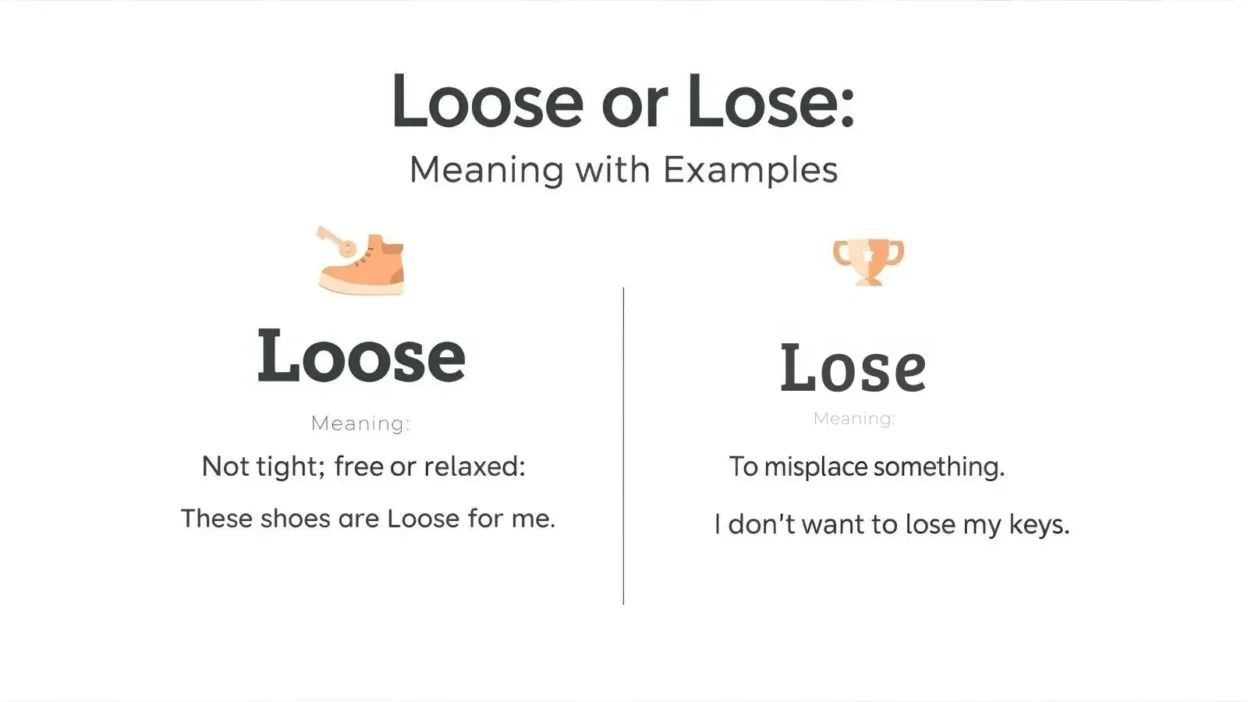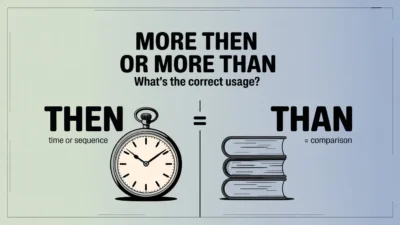Have you ever seen someone write “loose” when they actually meant “lose”—and felt a little confused yourself?
Don’t worry, you’re not the only one. These two words look and sound so close that it’s easy to mix them up.
If you’ve been searching for “loose or lose”, this quick guide is made just for you.
I’ll explain the difference in super simple words, give you clear one-line examples, and show you how to use each correctly in daily life, schoolwork, or even casual chats.
By the end, you’ll never hesitate again about which one to pick!
Loose or Lose – Quick Answer
- Loose (with two “o”s) → adjective, meaning “not tight” or “free.”
- Example: The shirt is too loose.
- Example: The shirt is too loose.
- Lose (with one “o”) → verb, meaning “to misplace” or “to fail to win.”
- Example: Don’t lose your keys.
- Example: Don’t lose your keys.
👉 Quick tip: If you can replace it with “not tight,” use loose. If you mean “misplace” or “fail,” use lose.
The Origin of Loose or Lose
Both words come from Old English but took different paths:
- Loose comes from lēas, meaning “free, unbound, or empty.”
- Lose comes from losian, meaning “to perish or be destroyed.”
Over time, their spellings evolved differently, but the similar sounds stayed. That’s why modern speakers often confuse them.
British English vs American English Spelling
The good news: “loose” and “lose” are spelled the same in both British and American English.
But the confusion still exists because English speakers everywhere pronounce them almost the same. The vowel length is what separates them in speech:
- Loose → rhymes with “moose.”
- Lose → rhymes with “choose.”
Comparison Table
| Word | Meaning | Example Sentence | Pronunciation |
| Loose | Not tight, free | The bolt is loose. | /luːs/ |
| Lose | Misplace, fail | We might lose the game. | /luːz/ |
Which Spelling Should You Use?
- In the US → Use loose and lose exactly as shown above.
- In the UK & Commonwealth → Same rule applies.
- For global writing → Stick to standard usage (loose = not tight, lose = misplace/fail).
Unlike color/colour or center/centre, this is not a British vs American spelling issue—it’s the same everywhere.
Common Mistakes with Loose or Lose
- I don’t want to loose my job. ❌ → I don’t want to lose my job. ✅
- She will loose the race. ❌ → She will lose the race. ✅
- The screw is lose. ❌ → The screw is loose. ✅
- Don’t loose hope. ❌ → Don’t lose hope. ✅
Loose or Lose in Everyday Examples
- Emails: Please don’t lose track of the deadline.
- News headlines: Team expected to lose key player.
- Social media: My jeans are too loose now—time for shopping!
- Formal writing: Organizations cannot afford to lose credibility.
Loose or Lose – Google Trends & Usage Data
Search data shows that people often type “loose weight” instead of the correct “lose weight.” This mistake spikes every January when New Year’s resolutions trend.
According to Google Trends:
- The confusion is highest in the US, India, and the Philippines.
- “Lose weight” is one of the top queries where the error appears.
Comparison Table of Search Confusions
| Correct Phrase | Common Mistake |
| Lose weight | Loose weight |
| Don’t lose hope | Don’t loose hope |
| Lose the game | Loose the game |
FAQs:
Q1: What is the difference between loose and lose?
A: Loose = not tight, lose = misplace or fail.
Q2: Is it “lose weight” or “loose weight”?
A: Correct spelling: lose weight.
Q3: Can “loose” ever be a verb?
A: Rarely, yes—it can mean “to set free,” but this is old-fashioned.
Q4: Why do people confuse loose and lose?
A: Because they sound similar and only differ by one letter.
Q5: Is it “don’t lose hope” or “don’t loose hope”?
A: Correct: don’t lose hope.
Q6: Do British people spell “lose” differently?
A: No—both British and American English use the same spelling.
Q7: What is the easiest way to remember the difference?
A: Think: “Loose has two O’s like in too loose. Lose has one O—don’t lose the extra one!”
Conclusion
The mix-up between loose and lose is one of the most common spelling errors in English, but it’s also one of the easiest to fix once you know the difference.
Remember:
- Loose = not tight, free.
- Lose = misplace, fail.
The spelling is the same across British and American English, so there’s no regional variation to worry about.
Most mistakes happen in common phrases like lose weight or don’t lose hope, where people accidentally add the extra “o.”
By keeping the simple memory trick in mind—don’t lose the extra “o”—you’ll always choose the correct word.
Clear writing builds trust, whether in casual texts, professional emails, or formal reports. Mastering this small detail can help you avoid big misunderstandings.

I’m Emma Collins, a grammar expert and author at Grammarnestly.com. I love helping readers master English with simple, practical grammar guides.
When I’m not writing, I enjoy reading, coffee, and exploring the beauty of language.



